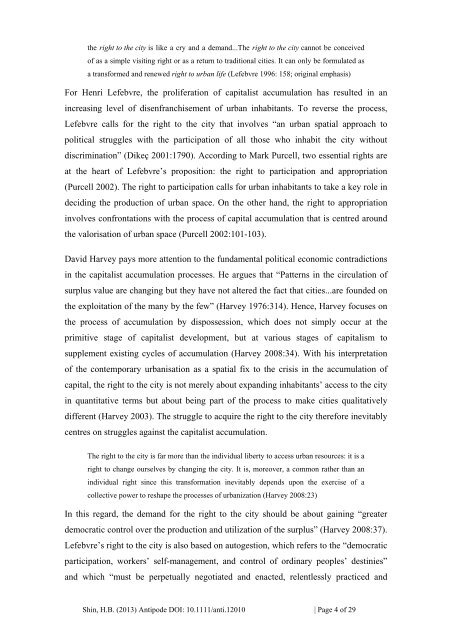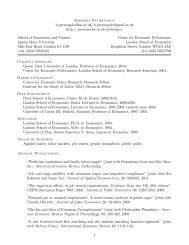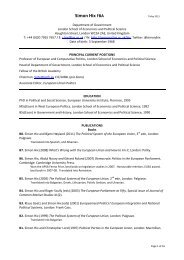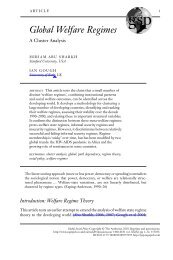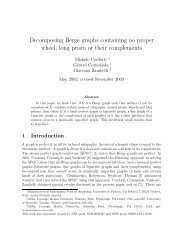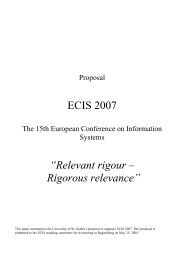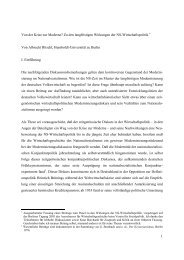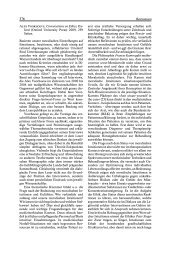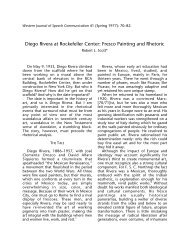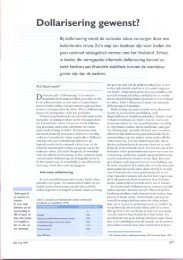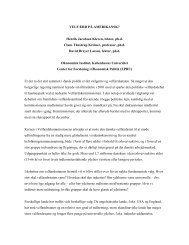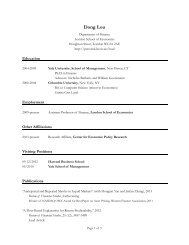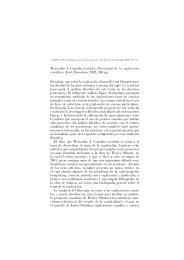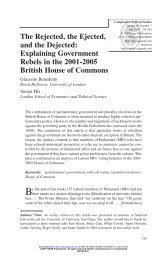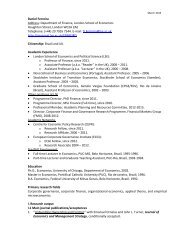View PDF - LSE - London School of Economics and Political Science
View PDF - LSE - London School of Economics and Political Science
View PDF - LSE - London School of Economics and Political Science
Create successful ePaper yourself
Turn your PDF publications into a flip-book with our unique Google optimized e-Paper software.
the right to the city is like a cry <strong>and</strong> a dem<strong>and</strong>...The right to the city cannot be conceived<br />
<strong>of</strong> as a simple visiting right or as a return to traditional cities. It can only be formulated as<br />
a transformed <strong>and</strong> renewed right to urban life (Lefebvre 1996: 158; original emphasis)<br />
For Henri Lefebvre, the proliferation <strong>of</strong> capitalist accumulation has resulted in an<br />
increasing level <strong>of</strong> disenfranchisement <strong>of</strong> urban inhabitants. To reverse the process,<br />
Lefebvre calls for the right to the city that involves “an urban spatial approach to<br />
political struggles with the participation <strong>of</strong> all those who inhabit the city without<br />
discrimination” (Dikeç 2001:1790). According to Mark Purcell, two essential rights are<br />
at the heart <strong>of</strong> Lefebvre’s proposition: the right to participation <strong>and</strong> appropriation<br />
(Purcell 2002). The right to participation calls for urban inhabitants to take a key role in<br />
deciding the production <strong>of</strong> urban space. On the other h<strong>and</strong>, the right to appropriation<br />
involves confrontations with the process <strong>of</strong> capital accumulation that is centred around<br />
the valorisation <strong>of</strong> urban space (Purcell 2002:101-103).<br />
David Harvey pays more attention to the fundamental political economic contradictions<br />
in the capitalist accumulation processes. He argues that “Patterns in the circulation <strong>of</strong><br />
surplus value are changing but they have not altered the fact that cities...are founded on<br />
the exploitation <strong>of</strong> the many by the few” (Harvey 1976:314). Hence, Harvey focuses on<br />
the process <strong>of</strong> accumulation by dispossession, which does not simply occur at the<br />
primitive stage <strong>of</strong> capitalist development, but at various stages <strong>of</strong> capitalism to<br />
supplement existing cycles <strong>of</strong> accumulation (Harvey 2008:34). With his interpretation<br />
<strong>of</strong> the contemporary urbanisation as a spatial fix to the crisis in the accumulation <strong>of</strong><br />
capital, the right to the city is not merely about exp<strong>and</strong>ing inhabitants’ access to the city<br />
in quantitative terms but about being part <strong>of</strong> the process to make cities qualitatively<br />
different (Harvey 2003). The struggle to acquire the right to the city therefore inevitably<br />
centres on struggles against the capitalist accumulation.<br />
The right to the city is far more than the individual liberty to access urban resources: it is a<br />
right to change ourselves by changing the city. It is, moreover, a common rather than an<br />
individual right since this transformation inevitably depends upon the exercise <strong>of</strong> a<br />
collective power to reshape the processes <strong>of</strong> urbanization (Harvey 2008:23)<br />
In this regard, the dem<strong>and</strong> for the right to the city should be about gaining “greater<br />
democratic control over the production <strong>and</strong> utilization <strong>of</strong> the surplus” (Harvey 2008:37).<br />
Lefebvre’s right to the city is also based on autogestion, which refers to the “democratic<br />
participation, workers’ self-management, <strong>and</strong> control <strong>of</strong> ordinary peoples’ destinies”<br />
<strong>and</strong> which “must be perpetually negotiated <strong>and</strong> enacted, relentlessly practiced <strong>and</strong><br />
Shin, H.B. (2013) Antipode DOI: 10.1111/anti.12010 | Page 4 <strong>of</strong> 29


